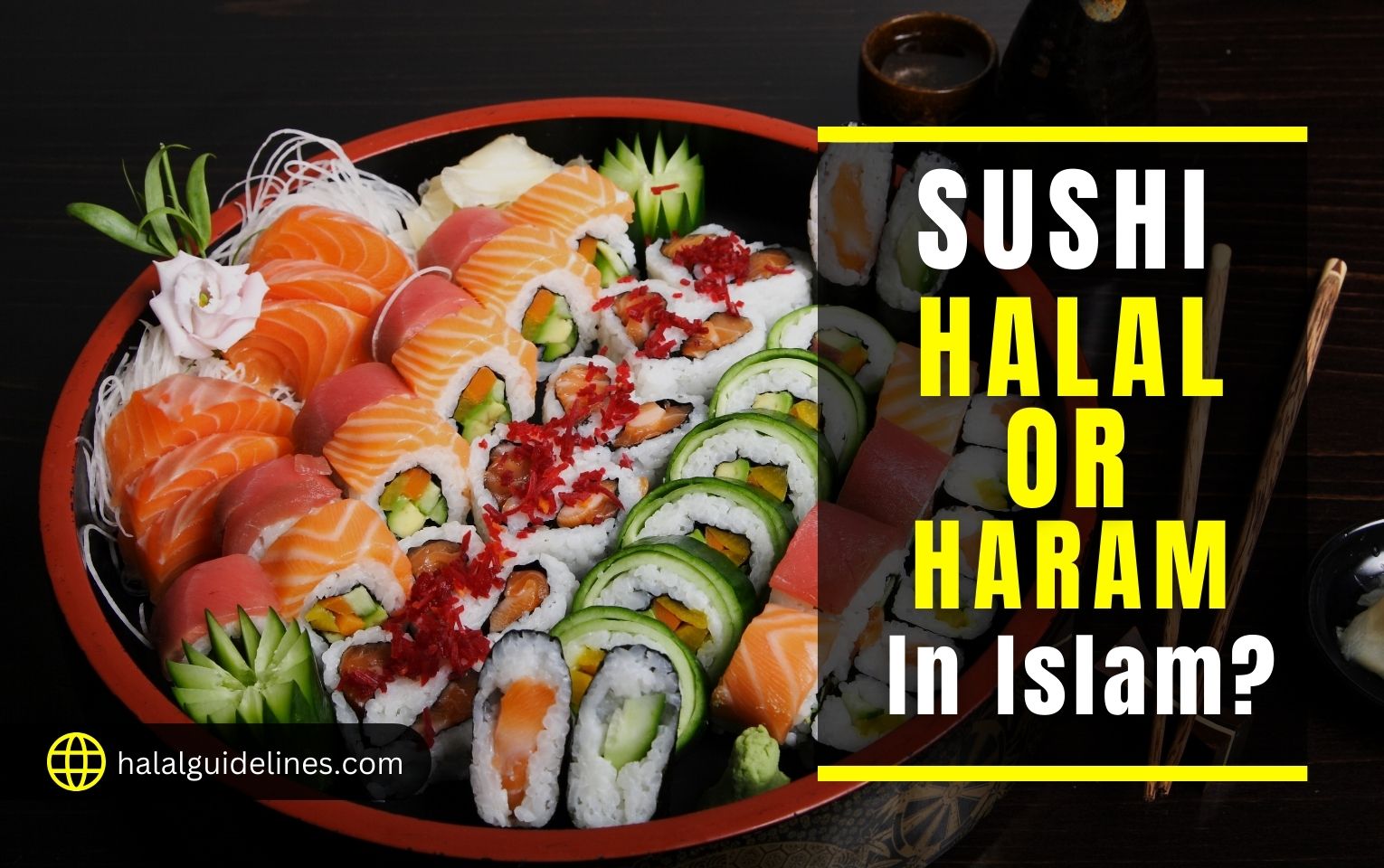If it contains any haram ingredients such as alcohol, non-halal meat such as pork, or other forbidden substances, then it would be considered haram.
Muslims need to ensure that the ingredients used in sushi align with Islamic dietary laws before consuming it.
The Halal Status of Seafood in the Quran
When discussing whether popular foods like sushi are permissible (halal) or prohibited (haram) in Islam, it is important to evaluate the original sources of Islamic law. The Quran itself does not explicitly mention sushi. However, it does provide guidance on the consumption of seafood which is integral to dishes like sushi.
According to verses in the Quran, seafood from the ocean is considered universally halal for Muslims. This comes from passages that outline permissions from Allah on what meats are allowed. While certain restrictions exist in Islam for land meats like pork, the Quran gives seafood a special status as being inherently permissible.
Surah Al-Ma’idah (Chapter 5 – The Food), Verse 96
Transliteration: Wa Uhilla Lakum Saydu Al-Baari Wa Ta’aamuhu Mataa’an Lakum Wa Lilsayyaara(ti) Wa Hurrima Alaikum Saydu Al-Barri Maa Dumtum Hurum(aa); Wattaqullah(a) Al-Ladhee ‘Ilayhi Tuhsharoona English Translation: Lawful to you is game from the sea and its food as provision for you and the travelers, but forbidden to you is game from the land as long as you are in the state of ihram. And fear Allah to whom you will be gathered. The key part that makes seafood clearly halal is: “Lawful to you is game from the sea and its food as provision for you…” While some Islamic experts disagree on whether raw seafood is an exception, the Quranic passage gives fish and shellfish a baseline halal status according to most interpretations. This provides support for classifying sushi itself as halal, on the basis that core ingredients like fish are allowed based on the Quran. Many Islamic scholars say it’s halal to eat seafood because the Quran allows it. But when it comes to sushi, some aren’t sure if it’s okay according to Islamic teachings. Here are the five factors that could clear your mind before eating sushi make it Haram: Some types of sushi might have things in them that Muslims can’t eat, like pork or non-halal meats. The important thing is to avoid anything that’s forbidden in the Quran or Hadith. Sushi could become not permissible if the cooking tools, plates, or preparation tables have touched haram foods earlier. Even fish dishes can change from halal to haram in Islam if they mix with haram during cooking or serving. Many popular sushi sauces contain forms of alcohol like rice wine or sake. Alcohol is forbidden in Islam. So sushi dishes served with alcohol-based sauces would be considered prohibited by Islamic standards. Islamic rules allow some special exemptions for food when in dire need. Some scholars argue raw fish is only acceptable when there is an urgent need to eat it for survival. Since sushi today is more of a delicacy food than a necessity, this viewpoint would deem it impermissible. Muslims are instructed through hadith to say “Bismillah” (in the name of Allah) before meals. By not doing this blessing for the food about to be consumed, including sushi, some scholars argue the food would not be considered properly halal. So, even if the seafood used in sushi is halal, the specific way it’s made and eaten can affect whether it’s okay to eat according to Islamic rules. As sushi gets more popular worldwide, Muslims have questions about whether it’s halal for them to eat. Some Muslims aren’t sure if it’s allowed because sushi often has raw fish and Japanese ingredients. Let’s talk about the halal ingredients used in sushi: Fish is the main ingredient in many sushi rolls and nigiri. This includes salmon, tuna, seabass, snapper, and other fish caught from the sea. As clearly stated in the Quran, all fish with scales are considered permissible (halal) for Muslims to eat. Therefore, there are no concerns about whether sushi is permissible for Muslims. Rice is a staple ingredient used in sushi as part of the rolls, nigiri, or sashimi. Plain rice or seasoned rice vinegar mixtures used are completely halal as well. Rice has no prohibitory implications for sushi’s halal status. Halal seafood often found in sushi includes shrimp, lobster, squid, octopus, and crab. These marine-based ingredients are considered permissible in Islamic texts, both from the Quran and hadith. Wraps used to roll sushi and rice include seaweed varieties like nori. Ocean plants like seaweed grown in or near bodies of halal water that have no harmful or intoxicating effects are considered permissible based on general principles of Islamic law on food from the sea. Vegetables often included in sushi rolls pose no issues either when it comes to halal considerations. Produce like cucumbers, avocado, carrots, and pickled daikon radish are perfectly acceptable ingredients for Muslims as long as they are pure and not mixed with any prohibited items. Properly slaughtered eel fish would be halal. Often prepared grilled in sushi, the fatty meat of freshwater and saltwater eels has a long history in Japanese cuisine. Famous for its strong spice, wasabi is a popular sushi side. The grated stem of this Japanese horseradish causes no problems with Islamic permissibility in sushi. In addition to vegetables like cucumber, sushi often incorporates Japanese daikon radishes, which are typically pickled and perfectly acceptable from an Islamic dietary standpoint. Sushi often comes with different sauces like ponzu, unagi sauce, spicy mayo, and ginger dressings. Many are halal, but make sure to avoid any with alcohol or other forbidden ingredients. As more Muslims are enjoying sushi, it’s really important to check if it’s halal. This means ensuring the ingredients and how it’s made follow Islamic rules about food. Since there are many types of sushi, it’s essential to double-check everything. Here are the tips to check your sushi is Halal or not: Remember: Being mindful of halal food practices ensures that you can enjoy your meal by your beliefs. With these steps, you can confidently navigate your dining experience and savor delicious halal options. A: Yes, sushi can be made halal if prepared with halal ingredients and following Islamic dietary guidelines. A: Yes, all-you-can-eat sushi can be halal if the restaurant ensures the use of halal ingredients and proper preparation methods. A: Mirin may not be considered halal due to its alcohol content, but halal substitutes can be used in sushi recipes. A: Raw sushi can be halal if it’s made with halal-certified fish and other permissible ingredients. A: Umi Sushi’s halal status depends on its adherence to halal standards, so it’s important to verify with the restaurant. A: Nori, the seaweed used in sushi, is typically halal unless it’s processed with non-halal ingredients. A: Salmon sushi can be halal if sourced from halal-certified suppliers and prepared according to Islamic dietary laws. A: Hei Sushi’s halal status varies, and it’s recommended to check with the restaurant for their halal certification. A: Wasabi is generally considered halal, but it’s essential to ensure its ingredients are permissible. A: No, sushi with alcohol is strictly prohibited in Islam. A: Azuma Sushi’s halal status depends on its sourcing and preparation methods, so verification is advised. A: Sakura Sushi’s halal status varies by location, so it’s advisable to inquire about their certification. A: Tanoshi Sushi’s halal status should be confirmed with the restaurant to ensure compliance with halal standards. A: Yes, octopus sushi can be halal if it’s sourced from halal-certified suppliers and prepared according to Islamic dietary guidelines. A: Sakae Sushi’s halal certification status should be checked with the restaurant as it may vary. Hei Sushi’s halal status depends on its adherence to halal standards, so verification is recommended. A: Mentai sushi’s halal status depends on the ingredients used, so it’s essential to ensure they comply with halal guidelines. As Muslims, it’s important to eat food that follows Islamic rules, called halal. We should avoid anything that’s not allowed, known as haram. Let’s ask Allah for help in picking the right food and enjoying our meals while staying true to our faith. By choosing halal, we show our commitment to Islam and make Allah happy. Let’s stick to halal food to strengthen our bond with our religion and each other.
1. Ingredients Not Allowed in Islam
2. Touching Haram Foods During Preparation
3. Adding Alcoholic Ingredients
4. Eating for Pleasure, Not Need
5. Not Saying Allah’s Name Before Eating
More related Article suggestions:

1. Halal Fish Meat
2. Rice: A Universal Sushi Component
3. Seafood
4. Wrapping it Up Seaweed’s Status
5. The Veggie Factor Produce in Sushi
6. Eel A Halal Seafood Option Used in Sushi
7. Wasabi The Spicy Green Paste
8. Radish (A Japanese Pickle)
9. Variety of Sauces (Watch out for Alcohol)
Q: Are sushi considered halal, and can it be enjoyed within Islamic law?
Q: Is it permissible to indulge in all-you-can-eat sushi while adhering to halal principles?
Q: Is mirin, a sweet rice wine commonly used in sushi, compliant with halal standards?
Q: Is raw sushi halal in Islam?
Q: Is Umi Sushi halal status or not?
Q: Can we confirm that nori, the seaweed in sushi, aligns with halal requirements?
Q: Is salmon sushi considered halal?
Q: What is the halal certification status of Hei Sushi?
Q: Is wasabi sushi halal according to Islamic law?
Q: Is alcohol in sushi halal or not?
Q: How can we determine whether Azuma Sushi is halal-certified and aligns with Islamic dietary principles?
Q: What steps can be taken to verify the halal status of Sakura Sushi before dining there?
Q: Is Tanoshi Sushi known for its adherence to halal standards?
Q: Can octopus sushi be considered halal?
Q: Is Sakae Sushi certified as halal in Islam?
Q: What measures should one take to confirm the halal status of Hei Sushi’s offerings?
Q: Is mentai sushi permissible within halal dietary guidelines?







